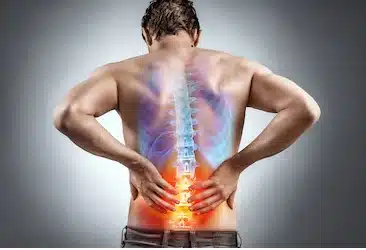Pain Conditions Treated
Peripheral Neuropathy
At Bay State Pain Management, Our Expert Pain Management Specialists Provide Effective Treatments for Peripheral Neuropathy Treatment in West Bridgewater; Norfolk, MA.

Peripheral Neuropathy
These are painful nerve conditions that affect the extremities. Peripheral neuropathies have many etiologies the most famous one is diabetic neuropathy. The treatment is usually in the form of aggressive medications, Physical Therapy, and neuromodulation.
Overview
Symptoms

How do you know if your back pain is serious?
Back pain is a very common reason for people to see a doctor. Typically, back pain responds to rest and at-home or over the counter medications and remedies. However, it can also be a serious, potentially debilitating problem that may require medical attention and intervention.
For those wondering if their back pain is serious, if your pain causes new bowel or bladder problems, accompanied by a fever, or follows a fall or other trauma to your back, then you should seek immediate care. Additionally, if your back pain is: severe and does not improve with rest; lasts longer than six weeks; spreads down your legs; causing weakness, numbness, or tingling in your legs; and is accompanied by unexplained weight loss, then you should contact a doctor.
For those over the age of 50, if you begin to experience back pain for the first time, have a history of cancer, osteoporosis, a history of steroid use, or excessive drug or alcohol use, then you should also see a doctor for a consultation.
What kind of doctor should you see for back pain?
Orthopedic doctors are board-certified surgeons who specialize in problems associated with the musculoskeletal system – which includes the spine. They are trained to help address conditions affecting the spine, such as ruptured or herniated discs, scoliosis, or other types of neck or low back pain.
You may also be referred to a pain specialist, which is a physician who specializes in the management and treatment of chronic and acute pain and the diagnosis of what may be causing the pain.
What symptoms that could be associated with back pain should prompt you to see a doctor?
There are a number of symptoms that are associated with back pain that should prompt you to see a doctor and there are several warning signs in terms of back pain that doctors look for when evaluating your back pain. These symptoms include:
- An unresponsive fever accompanied by a fever, which could be a sign of a serious infection;
- If you have experienced serious trauma or, for those over 50, minor trauma, your doctor will want to take a serious look at your back pain, as even a minor fall at an advanced age can cause a potential fracture;
- Any numbness or tingling, which is typically an indication of nerve irritation or damage and is much more significant than typical pain;
- Experiencing loss of bowel or bladder function and control, which can be a sign of a rare, serious condition known as cauda equina syndrome, which can happen as a result of a herniated disk or fracture, tumor, spinal stenosis, or trauma;
- If you have a medical history of cancer, a suppressed immune system, osteoporosis, or chronic steroid use;
- If you are experiencing a symptom known as “foot drop,” meaning that your toes drag on the ground while walking and you must consciously lift your foot higher to compensate.
In addition, if your pain has lasted longer than six weeks and is not responding to over the counter medications or at-home treatment, you should see your doctor as there may be more serious underlying causes to your back pain that might signal that there is a potentially serious condition involved.
Why is a pain management doctor a good choice to be treated for back pain?
Pain management doctors are specialists who have training in the evaluation, diagnosis, and treatment of different kinds of pain, which may be the symptom of a variety of conditions – both acute or chronic, or a combination of causes. Pain management specialists are trained to evaluate patients with complicated medical issues and have a deep understanding and knowledge of the specialized tests designed for the diagnosis of conditions which can cause pain. They are also incredible knowledgeable when it comes to the treatment of pain and are often on the cutting edge of new technologies and techniques used in its treatment.
For those looking for treatment of their lower back pain, then Dr. Algendy at Bay State Pain Management Center is here to help. Please call (508) 4362555 to schedule an appointment or consultation.